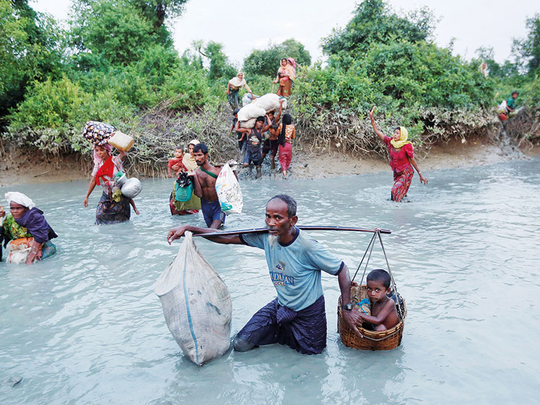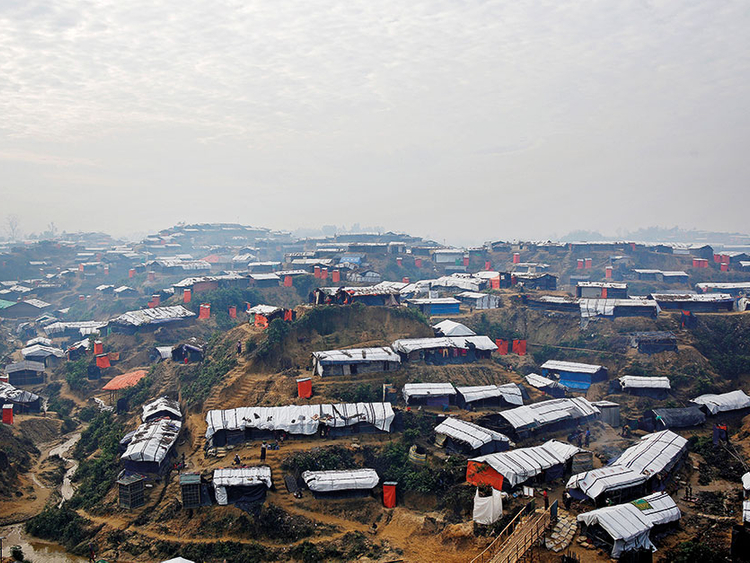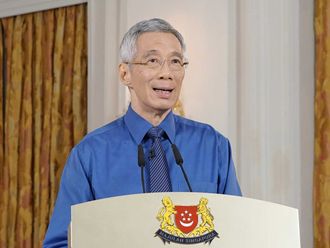
SHAH PORIR DWIP, Bangladesh: A skinny finger of water separates Bangladesh from Myanmar, and the other night a group of men sat on the Bangladeshi side, peering into the darkness, wondering what was left for them.
For these men, ethnic Rohingya Muslim refugees from Myanmar, there is certainly nothing back across the water. Home doesn’t exist anymore. Myanmar’s army wiped out their villages in August, turning their houses, their mosques, their corrals, their grain stores, their fields, even their trees into dunes of ash.
The muddy camps just inside Bangladesh, where more than 600,000 Rohingya have since fled, provide no solution, either.
Officials from Bangladesh, a very crowded country, insist that Myanmar must take the Rohingya back. But Myanmar’s Buddhist majority drove them out in the first place, creating a climate of hate that vilified the Rohingya as subhuman. Many people in Myanmar insist the Rohingya are illegal immigrants from Bangladesh, even though Rohingya have lived in Myanmar for hundreds of years.
Few ethnic groups on earth have been locked into such hopeless logic, marooned on an international border, unwanted by either side, weary, traumatised, desperately stateless, their very origins in dispute.
“The Rohingya are the wretched of the earth,” said Leonard Doyle, a spokesman for the International Organization for Migration, the agency helping coordinate relief efforts. “Nobody wants them. I’m talking about seven-year-olds who have witnessed their parents get their throats slit who are standing in bare feet on the border right now, asking: ‘What’s going to happen to me?’”
Bangladesh and Myanmar have held rounds of talks about what to do with the refugees, without any Rohingya representatives present. Likewise, the United Nations recently convened a major event in Geneva called the Pledging Conference for the Rohingya Refugee Crisis. Dozens of donor nations and aid agencies were invited but no Rohingya refugees.
Many Rohingya now worry that without any input from them, their fate is being sealed. It is clear where most would stand if they were consulted.
“I will never go back to Myanmar,” said an older Rohingya woman named Morjan who spends her days under a plastic sheet in a camp. After her husband and son were slaughtered in front of her, she fled to Bangladesh. “Better you kill us here,” she said.
Bangladeshi officials have circulated a draft repatriation agreement, specifying how to verify that Rohingya refugees, many of whom are illiterate and do not have a piece of paper to their name, are from Myanmar. The proposal talks of a “first batch” of returnees and even mentions logistics and transport.
But Western aid officials said privately that this was a charade. The Rohingya would not be returning to Myanmar anytime soon, the aid officials said. But nobody was allowed to come out and say that, because it could alienate Bangladesh, which clearly does not want to host the refugees indefinitely but whose goodwill is needed right now.
Further complicating things, analysts said, was Myanmar stalling the efforts to help the Rohingya, hardly surprising considering how this crisis started. Witnesses have described, in disturbing detail, how Myanmar’s army burned down Rohingya village after Rohingya village, terrorising and massacring civilians — of any age, including infants — with one apparent purpose: to erase the Rohingya from the landscape.
The violence is not over. One Rohingya advocacy group said this week that Rohingya homes were still being burned to the ground.
Each night here on the border, hundreds of Rohingya keep arriving in fleets of wooden boats that float silently across the mouth of the Naf River, the brackish waterway that separates the two countries.
A group of New York Times journalists waited in the darkness alongside worried family members as a searchlight on the Myanmar side swung back and forth, back and forth, an eerie metronome moving across the gloom.
“How can we talk about repatriation?” asked Tun Khin, one of the few Western-educated Rohingya representatives who have been able to reach out to the international news media. “People are still fleeing.”
Bangladesh finds itself in an impossible situation. One of Asia’s poorest countries, it is home to 160 million people — half the population of the United States — squeezed into a space the size of Iowa. The Rohingya refugees have taken over hillsides, chopped down countless trees to build their shelters and put such a stress on the economy of Bangladeshi border villages that prices have shot up threefold, angering long-standing residents.
Facing international pressure to host the refugees and some domestic pressure to push them out, Bangladesh’s prime minister, Sheikh Hasina, has said that her country would continue to help the refugees on humanitarian grounds but that Myanmar must “take their nationals back.”
She has ordered the army to seal off roads around the camps to make sure Rohingya do not start migrating to towns. Her government has also decreed that Rohingya were not allowed to work or register for local cellphone service.
With no way to support themselves, the Rohingya refugees are completely dependent on aid. UN agencies such as the World Food Program have been feeding them, while international and Bangladeshi charities have provided medical care, plastic tarps, cooking pots and other basics.
How long the Rohingya are expected to stay will affect the next set of issues, including questions like whether Bangladesh or outside groups should begin building schools for them.
For Rohingya, the conditions in Bangladesh are an uncomfortable echo of the apartheidlike system they were put under in Myanmar, the result of a long campaign of marginalisation and dehumanisation.
For decades, the Rohingya have been pushed around this shoulder area of Asia where the Indian subcontinent and the Southeast Asian peninsula meet. Their lowly status and history of being demonised allowed this latest crisis to happen, analysts say.
Myanmar’s leaders steadily stripped away their rights, making it extremely difficult for Rohingya to get a government job or a passport, go to school or even be legally married. Government soldiers preyed upon them; revered Buddhist monks openly called them insects and snakes.
Each evening, Rohingya men sit on a crumbled walkway near the beach, waiting for family members still trying to get out. By 9pm, the boats usually start arriving. Without a sound, they materialise from the murk, rowing in from the Myanmar side, engines off, for stealth.
On a recent night, one of the heaviest, hundreds of Rohingya refugees splashed out. Many were quiet, and some wept as they waded ashore.
It was difficult to tell which men had reunited with their families and which had to return to the camps alone.
In the darkness, walking slowly up the beach, the group moved as one.












